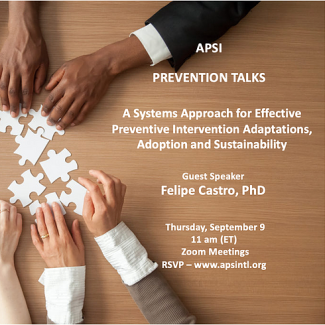A Systems Approach for Effective Preventive Intervention Adaptations, Adoption and Sustainability

During the next Prevention Talk, APSI will be addressing the following question: How do we in the prevention community need to adapt evidence-based interventions to fit different prevention delivery systems and contexts?
Prevention scientists have developed many efficacious preventive interventions in a variety of areas.
Despite the demonstrated effectiveness of many evidence-based preventive interventions (EBPIs), two pervasive problems limiting their widespread use are:
(a) low rates of adoption, and
(b) limited sustainability.
Dr. Felipe Gonzalez Castro (College of Nursing and Health Innovation at Arizona State University) and his team conducted the Robert Wood Johnson Foundation sponsored study of the adaptation, adoption, and sustainability of evidence-based drug prevention interventions, middle school principals and teachers from low-income rural communities in areas of high opiate use were interviewed. These educators reported some of the major barriers to adoption which will be highlighted during the talk.